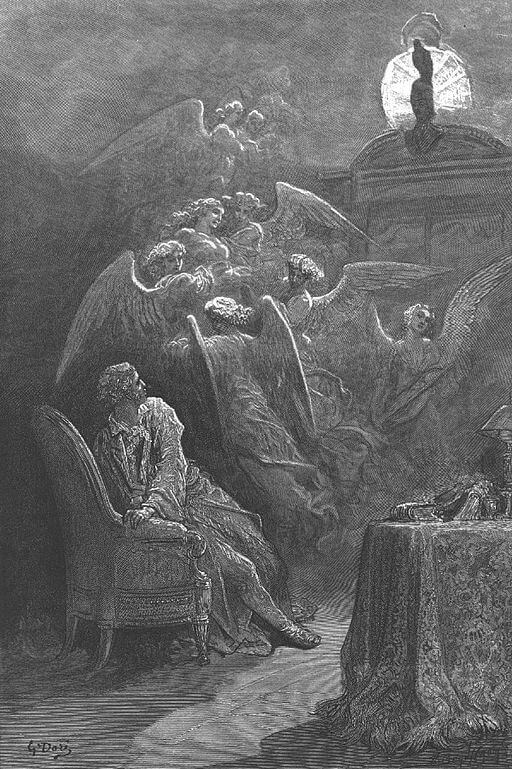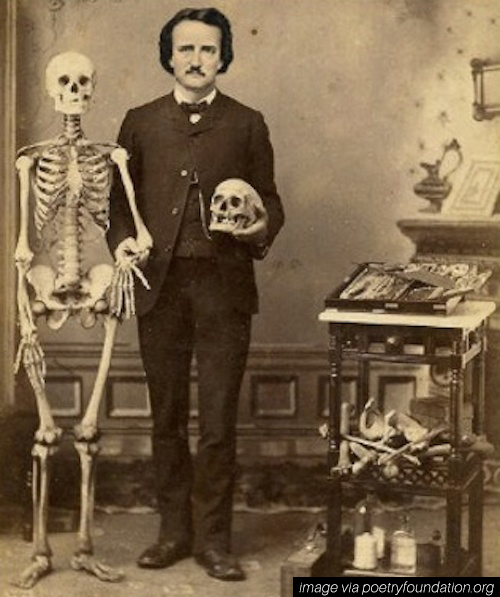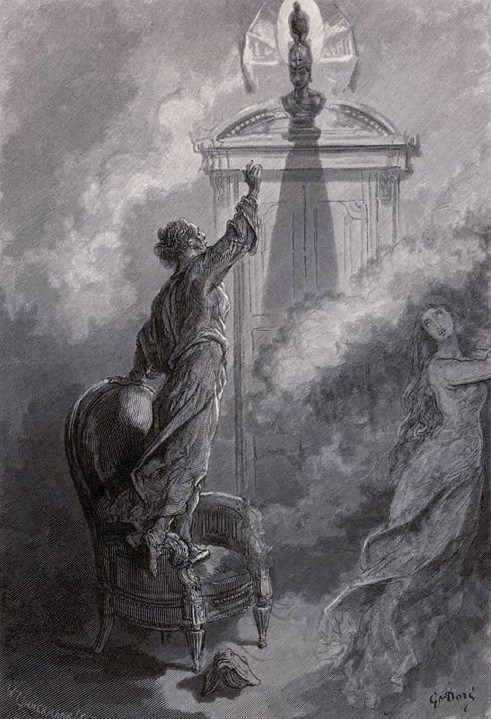Home » Posts tagged 'United States of America in the 19th century'
Tag Archives: United States of America in the 19th century
THE RAVEN
November 12, 2017 7:42 am / Leave a comment

The writings of Edgar Allan Poe (1809 – 1849) evokes images of murderers, madmen, premature burials, and mysterious women who return from the dead. Our common image of him is of a mysterious, somewhat melancholy figure who frequents cemeteries and other creepy places. However, his influence extends far beyond the gothic and the macabre, he is credited with the invention of the modern detective story and with innovating the science fiction genre. Over the course of his lifetime, Poe wrote hundreds of essays, books on scientific theory, short stories, poems, book reviews, and novels. His classics, like The Tell-Tale Heart and The Fall of the House of Usher, have thrilled readers for nigh-on two centuries. For this week’s cultural article, we will be examining his poem, The Raven.
BIOGRAPHY

Edgar Allen Poe was born on January 19th, 1809 in Boston, Massachusetts. Both his father, David Poe, Jr. (1784 – 1811), and mother, Elizabeth Arnold Hopkins Poe (1787 – 1811), were travelling actors who died by the time Poe was three-years-old. While his siblings, William Henry Leonard Poe (1807 – 1831) and Rosalie Poe (1810 – 1874), were sent to live with other families, Poe was adopted by the wealthy tobacco merchant, John Allan (1779 – 1834), and his wife, Frances Valentine Allan (1784 – 1829), in Richmond, Virginia.
In 1826, Poe left home to study ancient and modern languages at the University of Virginia. Unfortunately, John Allan had provided Poe with only a third of the funds he would need to support himself at the university. Although Poe excelled in his classes, he managed to accumulate a considerable amount of debt. By the end of his first term, Poe’s financial situation had become so dire that he was forced to burn his furniture to keep warm.
Poe left the university after just a year and returned home. Back in Richmond, Poe discovered that his fiancée, Elmira Royster (1810 – 1888), had become engaged to Alexander Shelton (1807 – 1844). He lived in John Allan’s home, but animosity between the two caused him to leave after only a few months.
John Allan had raised his adopted son with the intention that he would become a businessman and gentleman. Poe, however, rejected his adoptive father’s aspirations and set out to emulate his hero, Lord Byron (1788 – 1824), by making himself a great writer and adventurer. He achieved the former with the publication of his first book, Tamerlane, at the age of eighteen. The latter he achieved by enlisting in the United States Army. Two years later, he was accepted into the United States Military Academy at West Point.
Following his expulsion from West Point after only eight months, Poe travelled to Baltimore, Maryland – the home of his biological father – to seek help from relatives. Although one of his relatives robbed him in the middle of the night, Poe was able to find refuge in the home of his aunt, Maria Clemm (1790 – 1871). It was there that Poe met and fell in love with his cousin, Virginia Eliza Clemm (1822 – 1847). Around the same time, Poe’s adoptive father, John Allan, died. Poe, who was living in poverty at the time, was left out of Allan’s estate.
Despite this, Poe’s writing career was progressing at a steady pace. He was already publishing his short stories and was able to gain an editorial position at the Southern Literary Messenger in Richmond. The combination of Poe’s scathing book reviews and his sensational stories made the Southern Literary Messenger the most popular magazine in the southern United States.
In 1835, the twenty-six-year-old Poe married the thirteen-year-old Virginia and brought her and her mother with him to Richmond. Later, dissatisfaction with his pay at the Southern Literary Messenger would cause Poe and his young wife to move to New York, and later Philadelphia, Pennsylvania, where he would write for numerous magazine publications.
Poe wrote his most famous poem, The Raven (1845), whilst living in New York. Its publication made him a household name and provided him with the funds and opportunities to buy the Broadway Journal, publish two books, and demand higher wages. However, rumours of an extra-marital affair, financial difficulties, and Virginia declining health forced Poe to leave the city in 1846. Poe moved to a country cottage where, in 1847, Virginia succumbed to tuberculosis.
Poe slipped into a deep depression and lost the ability to write for several months. Then, in the summer of 1849, he returned to Richmond and rekindled his relationship with his former fiancée, Elmira Royster Shelton. Elmira, like Poe, was a widow. The pair became engaged and planned to marry when Poe returned from a trip to Philadelphia and New York.
On his way to Philadelphia, Poe disappeared in Baltimore for five days. He was found in the bar room of a public house (which had been used as a polling station in a recent election) in a state of delirium. Poe was taken to Washington College Hospital. Edgar Allen Poe died there, aged forty, on October 7th, 1849.
POEM

Once upon a midnight dreary, while I pondered, weak and weary,
Over many a quaint and curious volume of forgotten lore—
While I nodded, nearly napping, suddenly there came a tapping,
As of some one gently rapping, rapping at my chamber door.
“’Tis some visitor,” I muttered, “tapping at my chamber door—
Only this and nothing more.”
Ah, distinctly I remember it was in the bleak December;
And each separate dying ember wrought its ghost upon the floor.
Eagerly I wished the morrow;—vainly I had sought to borrow
From my books surcease of sorrow—sorrow for the lost Lenore—
For the rare and radiant maiden whom the angels name Lenore—
Nameless here for evermore.
And the silken, sad, uncertain rustling of each purple curtain
Thrilled me—filled me with fantastic terrors never felt before;
So that now, to still the beating of my heart, I stood repeating
“’Tis some visitor entreating entrance at my chamber door—
Some late visitor entreating entrance at my chamber door;—
This it is and nothing more.”
Presently my soul grew stronger; hesitating then no longer,
“Sir,” said I, “or Madam, truly your forgiveness I implore;
But the fact is I was napping, and so gently you came rapping,
And so faintly you came tapping, tapping at my chamber door,
That I scarce was sure I heard you”—here I opened wide the door;—
Darkness there and nothing more.
Deep into that darkness peering, long I stood there wondering, fearing,
Doubting, dreaming dreams no mortal ever dared to dream before;
But the silence was unbroken, and the stillness gave no token,
And the only word there spoken was the whispered word, “Lenore?”
This I whispered, and an echo murmured back the word, “Lenore!”—
Merely this and nothing more.
Back into the chamber turning, all my soul within me burning,
Soon again I heard a tapping somewhat louder than before.
“Surely,” said I, “surely that is something at my window lattice;
Let me see, then, what thereat is, and this mystery explore—
Let my heart be still a moment and this mystery explore;—
’Tis the wind and nothing more!”
Open here I flung the shutter, when, with many a flirt and flutter,
In there stepped a stately Raven of the saintly days of yore;
Not the least obeisance made he; not a minute stopped or stayed he;
But, with mien of lord or lady, perched above my chamber door—
Perched upon a bust of Pallas just above my chamber door—
Perched, and sat, and nothing more.
Then this ebony bird beguiling my sad fancy into smiling,
By the grave and stern decorum of the countenance it wore,
“Though thy crest be shorn and shaven, thou,” I said, “art sure no craven,
Ghastly grim and ancient Raven wandering from the Nightly shore—
Tell me what thy lordly name is on the Night’s Plutonian shore!”
Quoth the Raven “Nevermore.”
Much I marvelled this ungainly fowl to hear discourse so plainly,
Though its answer little meaning—little relevancy bore;
For we cannot help agreeing that no living human being
Ever yet was blessed with seeing bird above his chamber door—
Bird or beast upon the sculptured bust above his chamber door,
With such name as “Nevermore.”
But the Raven, sitting lonely on the placid bust, spoke only
That one word, as if his soul in that one word he did outpour.
Nothing farther then he uttered—not a feather then he fluttered—
Till I scarcely more than muttered “Other friends have flown before—
On the morrow he will leave me, as my Hopes have flown before.”
Then the bird said “Nevermore.”
Startled at the stillness broken by reply so aptly spoken,
“Doubtless,” said I, “what it utters is its only stock and store
Caught from some unhappy master whom unmerciful Disaster
Followed fast and followed faster till his songs one burden bore—
Till the dirges of his Hope that melancholy burden bore
Of ‘Never—nevermore’.”
But the Raven still beguiling all my fancy into smiling,
Straight I wheeled a cushioned seat in front of bird, and bust and door;
Then, upon the velvet sinking, I betook myself to linking
Fancy unto fancy, thinking what this ominous bird of yore—
What this grim, ungainly, ghastly, gaunt, and ominous bird of yore
Meant in croaking “Nevermore.”
This I sat engaged in guessing, but no syllable expressing
To the fowl whose fiery eyes now burned into my bosom’s core;
This and more I sat divining, with my head at ease reclining
On the cushion’s velvet lining that the lamp-light gloated o’er,
But whose velvet-violet lining with the lamp-light gloating o’er,
She shall press, ah, nevermore!
Then, methought, the air grew denser, perfumed from an unseen censer
Swung by Seraphim whose foot-falls tinkled on the tufted floor.
“Wretch,” I cried, “thy God hath lent thee—by these angels he hath sent thee
Respite—respite and nepenthe from thy memories of Lenore;
Quaff, oh quaff this kind nepenthe and forget this lost Lenore!”
Quoth the Raven “Nevermore.”
“Prophet!” said I, “thing of evil!—prophet still, if bird or devil!—
Whether Tempter sent, or whether tempest tossed thee here ashore,
Desolate yet all undaunted, on this desert land enchanted—
On this home by Horror haunted—tell me truly, I implore—
Is there—is there balm in Gilead?—tell me—tell me, I implore!”
Quoth the Raven “Nevermore.”
“Prophet!” said I, “thing of evil!—prophet still, if bird or devil!
By that Heaven that bends above us—by that God we both adore—
Tell this soul with sorrow laden if, within the distant Aidenn,
It shall clasp a sainted maiden whom the angels name Lenore—
Clasp a rare and radiant maiden whom the angels name Lenore.”
Quoth the Raven “Nevermore.”
“Be that word our sign of parting, bird or fiend!” I shrieked, upstarting—
“Get thee back into the tempest and the Night’s Plutonian shore!
Leave no black plume as a token of that lie thy soul hath spoken!
Leave my loneliness unbroken!—quit the bust above my door!
Take thy beak from out my heart, and take thy form from off my door!”
Quoth the Raven “Nevermore.”
And the Raven, never flitting, still is sitting, still is sitting
On the pallid bust of Pallas just above my chamber door;
And his eyes have all the seeming of a demon’s that is dreaming,
And the lamp-light o’er him streaming throws his shadow on the floor;
And my soul from out that shadow that lies floating on the floor
Shall be lifted—nevermore!
POEM ANALYSIS
The Raven is characterised by the nightmarish nature of its images and themes. There is talk of wild dreams, burning souls, and imaginary perfumes. The poem’s most vivid image, that of the stately raven, tortures the narrator with its continuous repetition of the word, “Nevermore” (whether or not this is just a figment of the narrator’s imagination is never established). Similarly, the poem mentions “quaint and curious volume of forgotten lore” as a reference to antiquated, and forgotten, books of antiquated traditions and knowledge (who knows? maybe the narrator was experimenting with pagan or occult practices). Elsewhere, the poem mentions “a bust of Pallas”, a reference to the Greek titan Pallas, and “Night’s Plutonian shore”, referring to the underworld of Roman mythology.
